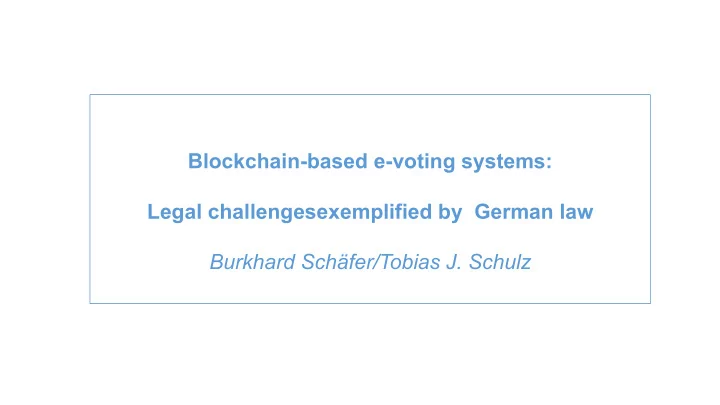

Blockchain-based e-voting systems: Legal challengesexemplified by German law Burkhard Schäfer/Tobias J. Schulz
Agenda Introduction 1 2 Blockchain-based e-voting systems 3 Legal framework in Germany 4 Discussion 5 Summary/Outlook 2
Agenda Introduction 1 2 Blockchain-based e-voting systems 3 Legal framework in Germany 4 Discussion 5 Summary/Outlook 3
Voter fraud hits the news 4
5
Blockchain-based e-voting systems Main Characteristics ■ Two conflicting demands Legally Secrecy of entitled the election voters only ■ “Follow my vote”: separated registrars and ID-verifiers ■ Use of anonymous voter –ID’s to ensure secrecy of the election ■ Can be used on fixed computers and mobile devices 6
Agenda Introduction 1 2 Blockchain-based e-voting systems 3 Legal framework in Germany 4 Discussion 5 Summary/Outlook 7
Legal framework in Germany Art. 38, paragraph 1 Grundgesetz «Members of the German Bundestag shall be elected in general, direct, free, equal and secret elections. They shall be representatives of the whole people, not bound by orders or instructions, and responsible only to their conscience.» ■ Additional criterion: Publicity of the election ■ 2009: Judgment of the Constitutional Court regarding “Nedap“ voting machines ■ Concretisation by § 35 Bundeswahlgesetz 8
Legal framework in Germany § 35 Bundeswahlgesetz (1) Voting machines may be used instead of ballot papers and ballot boxes to facilitate the casting and counting of votes. (2) Voting machines as defined in subsection (1) above must guarantee the secrecy of the ballot. For use at elections to the German Bundestag, their design must be officially approved for individual elections or on a general basis. The Federal Ministry of the Inter- ior shall decide on the approval of a voting machine on the application of the manufac- turer. The permission of the Federal Ministry of the Interior must be obtained before an officially approved voting machine can be used. This permission may be given for indi- vidual elections or on a general basis. […] 9
Agenda Introduction 1 2 Blockchain-based e-voting systems 3 Legal framework in Germany 4 Discussion 5 Summary/Outlook 10
Legal frameworks The main challenge 1: Balancing transparency with secrecy Transparency Secrecy 11
Legal frameworks: The main challenge 2: Balancing inclusivity with integrity Integrity Inclusivity 12
Agenda Introduction 1 2 Blockchain-based e-voting systems 3 Legal framework in Germany 4 Discussion 5 Summary/Outlook 13
High transparency and integrity, low inclusivity and no secrecy 14
High inclusivity, medium transparency and low integrity 15
High transparency and integrity, low inclusivity and no secrecy 16
The role of cryptography 17
Example: Followmyvote 18
19
Beyond transparency and secrecy • The problem of early voting and political disengagement. • Changing your vote once it was cast • Incentivizing public participation in the political process 20
21
Recommend
More recommend